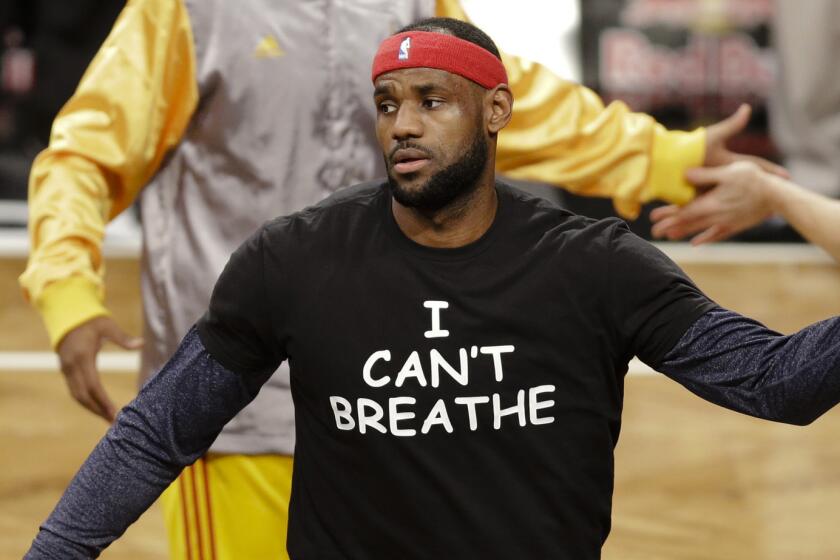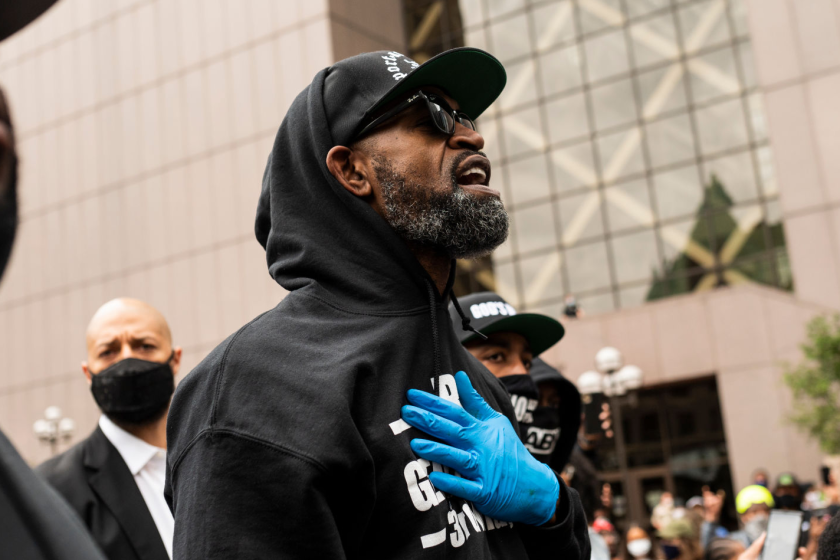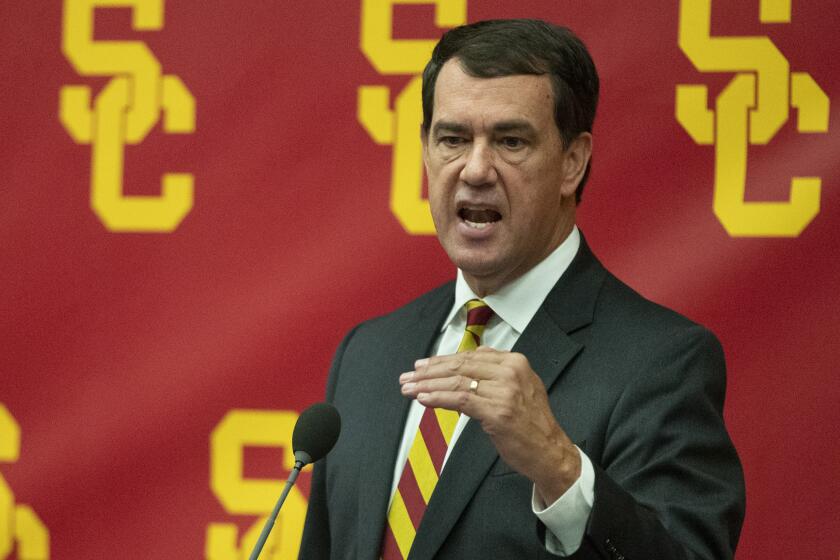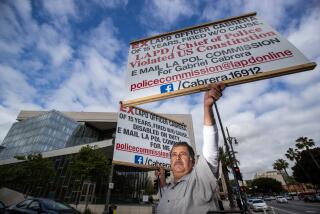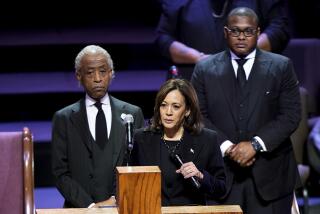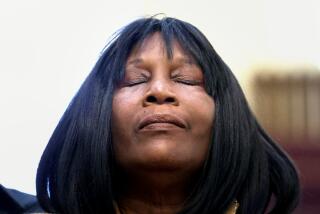Column: Anthony Lynn: ‘I’m pissed off and I don’t want to just put out a pretty statement’
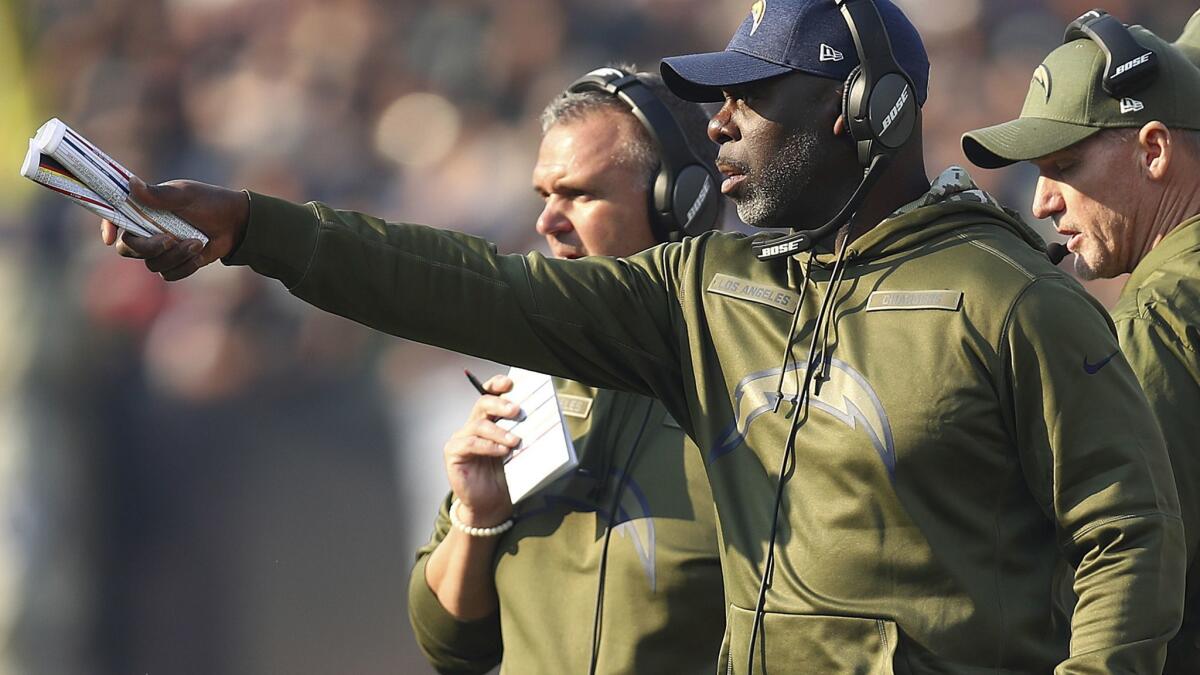
Chargers coach Anthony Lynn is one of my favorite people. Not favorite coach or favorite former player, but people. When I got a call that he’d like to talk about the death of George Floyd and the fallout, I dropped everything to drive to his home.
Lynn and I get along so well because we share a lot of the same values, particularly spiritually. He told me that when the world goes crazy — as it is right now — he gets on his knees and prays. “I don’t have all of the answers,” he told me, “but I know who does.”
He had not made any public statements about the events that have unfolded across the nation. On Monday we spent a couple of hours talking about the protests, criminal justice reform and what the NFL did to Colin Kaepernick for trying to get the word out.
Why not just release a statement?
I’ve read some good statements. I read Brian Flores from the Dolphins and I agree 100% with him. I read Doc Rivers’ statement and those guys spoke from the heart. I think statements are needed to bring awareness to the situation. But I want to do something too. I don’t want to just put [a statement] out there because it’s the right thing to do. I want change . . . so I guess it starts with having this conversation and talking things out. In 1992 I remember watching L.A. burn and here we are in 2020 and I’m watching it again and it just hit me, nothing has changed.
LeBron James and many other prominent athletes and coaches share their thoughts on the death of George Floyd and racism in the United States.
I haven’t done anything to make this a better place for my son. I remember having the talk with him when he was 16 about how to handle police and then at age 30 I called him up and just had the talk with him again because I’m so scared. I want to do something but to be honest with you, I don’t know what that is.
You said you want to do something, but why? Maybe if you can identify the why, then you can identify what the next step should be.
I’m glad you asked me that. I want to make this a better world for the next generation and not just for minorities, but for everybody. I believe in diversity, I believe in inclusion and if you believe in that, you can’t just stand silent. You can’t just stand on the sidelines and just watch. You got to say something, man. The thing that bothered me the most about [the] George Floyd murder was the three officers that said nothing. The guy who did it, yeah, he’s a [expletive], but the three who stood by and did absolutely nothing … I’m just stunned by that. I see that going on in every organization. I see good people saying nothing and doing nothing, allowing this to happen.
You mentioned 1992 and the Rodney King video; how did you feel viewing that?
I was in shock. There was video evidence of them doing what we always knew they were doing. And then when they didn’t find them guilty despite that evidence it made you sick. It was like, do they really care? Do we really matter? It was not a good feeling and I felt that way all over again watching George Floyd. We haven’t gotten better at all and in some cases, hell, it might have gotten worse.
Why do you say that?
Because the evidence could not be any better. We have so many videos of unarmed black men dying over the last decade and there’s no accountability, there are not consequences, like it’s OK. I just didn’t expect that at this point in time. What we’ve been doing is obviously not working and so we need to do something different. If it’s radical, then it’s radical. And I want to be a part of that.
The conversation about police brutality and criminal justice reform used to be something bubbling underneath. Now it’s talked about more in the mainstream. When you hear that phrase, what specifically about the criminal justice system would you like to see changed most?
In the wake of George Floyd’s death, NBA players and coaches are speaking out once again about racial injustice and what must change.
First, there are so many good officers. I did a first responders commercial a couple of years ago because I respect the first responders so much. They deserve so much more than what they get. They put their lives on line for us. Two of them helped saved my life after I was hit by that car in 2005. My son’s godfather is a police officer. So I’ve always had a great relationship with the first responders. But I also know it’s a club like a football team and they stick together like a football team. And the good ones get a bad rap because of the bad ones. I would challenge the good ones to speak up and not be silent anymore. That’s what I take away from all of this. George Floyd died with three officers right there who watched him die. It’s time for good officers to speak up and not accept that anymore.
I have a lot of good white friends and I’ve said to them that sometimes I feel our biggest enemy in this fight is good white people because they don’t believe people can do the things they do and be this evil. They just don’t believe it. And I’m like, “Guys, you are so naïve and you’re so naïve because you’re really good people. I don’t mean that in a derogatory way, but your naïveté is hindering the cause.”
“I also know it’s a club like a football team and they stick together like a football team. And the good ones get a bad rap because of the bad ones.”
— -Anthony Lynn on the police
To piggyback off of what you said, one of the things I’ve been really focused in on are the good apples getting a bad name from the bad ones and I equate it to this analogy: If you’re thirsty and I offer you a glass of water, you likely will drink it with no problem. But if you’re thirsty and I pour you a glass of water and then spit in it, you wouldn’t want to drink that water. Even though the vast majority of the glass is refreshing, cold water, that spit ruins the entire glass. In the real world, that drop of spit is racism, so all those good things that you do — go to church, treat your wife with respect, donate to good causes — all those things get ruined because you tolerated that drop of spit in the glass. What would you like to see the NFL, government do to get rid of that drop of spit that’s ruining all of the good water?
I would say one thing and it’s one of the things my mother raised me on: Treat people the way you want to be treated. Treat everyone fairly. You wouldn’t want someone to spit in your glass; why in the hell would you want to spit in someone else’s? To me it’s not that hard, but obviously it must be because we can’t do it. It seems simple, right?
Yeah, it seems simple but 400-plus years we still have spit in our glass. Speaking of: The NFL did something I found highly offensive and intellectually dishonest. I saw a statement after this weekend and I didn’t see the words “black,” “white,” “race,” “racism” or the name “Colin Kaepernick.” How difficult is it to know what he was trying to fight for and how the NFL responded and treated him, and yet continue to work for the NFL?
People completely misunderstood Colin and what he was trying to do. People talked about disrespecting the flag . . . the flag covers a lot — patriotism and civil rights and other things. And Colin was speaking out against the injustice and a lot of people didn’t catch on to that because it was happening during the national anthem. They thought it was disrespectful to the flag. I was surprised by the number of people who didn’t know why he was protesting. I got letters from people. I had people walk up to me and ask, “Coach, what are you going to do if someone on your team protests?” And I had to explain to them that Colin is taking a knee for criminal justice [reform] and police brutality and once you broke it down, they were like, “Oh, we didn’t know that. We thought he was protesting the flag.” And that was the case for a lot of people I came across.
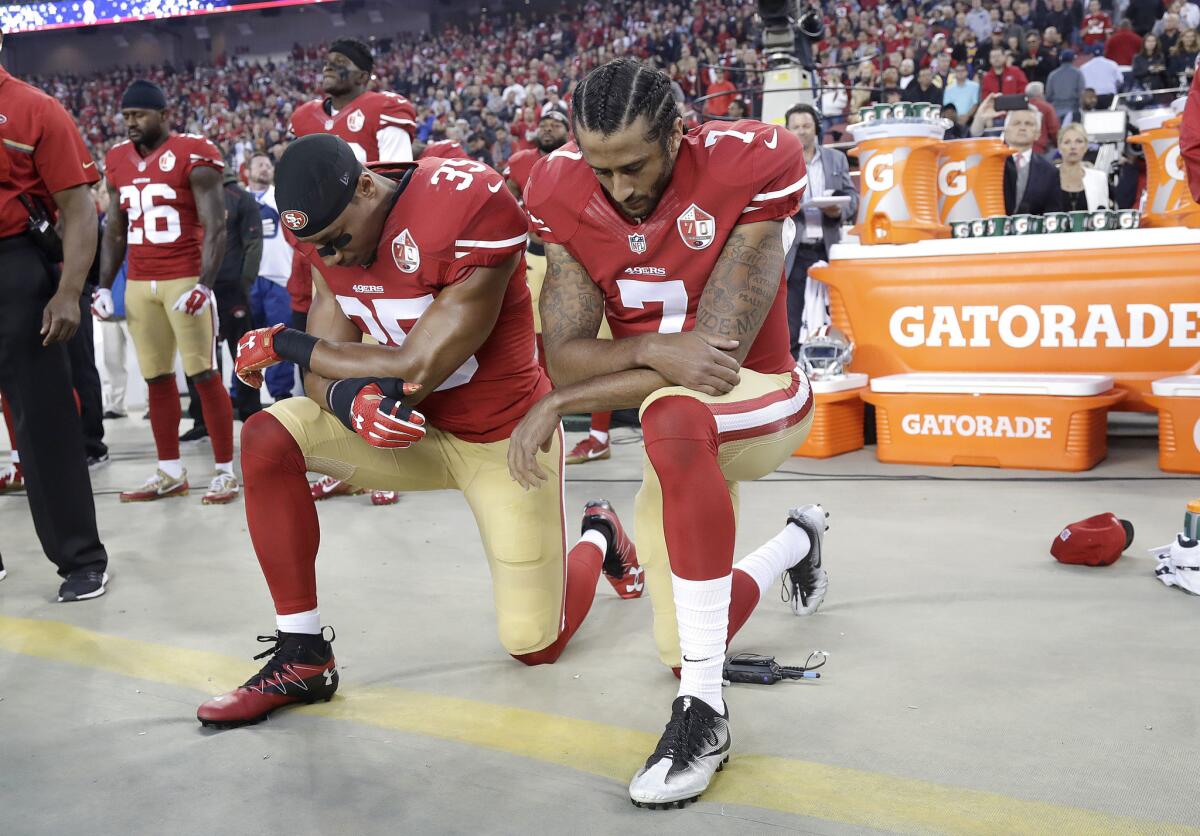
Whose fault was it that the message got diluted or lost? Was it his? The media?
A lot of people for their own political reasons pushed out the wrong narrative. A lot of people didn’t catch on as to why he took a knee. I understood and applauded him for it. At the same time, I’m never going to take a knee during the national anthem because I have an uncle that was a Marine and a father that is a vet. When I stand for the national anthem, I think of them. I think of the people who died for the rights and liberties I have right now and I give them that respect. That’s how I think toward the national anthem. Now some people may look at that and think of social justice and how jacked up that is. I’ll take a knee before and after the national anthem all day long, but I’m not going to tell someone else how they should protest. I thought it was a shame that Colin’s message got lost because people kept bringing up patriotism. It was brave for him to do that. I have a lot of respect for that young man standing up for something outside of the “Big 3” — God, family, football — and I have to say social justice right now is challenging my priorities. Right now I can’t think of anything besides social justice.
The fact that it was Colin Kaepernick and the San Francisco 49ers only made the situation worse.
So knowing he essentially lost his career over it, how does that make you feel?
I didn’t like it. I know when you look at 32 quarterbacks in the National Football League, Colin could have been one of the 32. If not, he could have been a quality backup. For me being an African American head coach, this is tough.
Let’s talk about solutions. You said you wanted to make the world a better place; what does that look like and how do we get there?
First thing I had to do is get out there. I’ve been sitting here in the house and was just consumed with these protests and the coverage. I felt there was a game going on and I wasn’t in. Reminds me of the time when I was a young coach and the head coach came to me and said “You need to buy a ticket.” I was like, “What do you mean I need to buy a ticket?” And he said “You’re coaching like a damn spectator right now,” and so that was the last time a coach called me a spectator, because my head was always in the game. So with the protests, I felt like a spectator. So I went out and joined the protesters in Huntington Beach. I wanted to be a part of it. I wanted to see what it was like to experience it and it was pretty intense. I saw a lot of passionate people and it felt as if I was marching for the right reasons.
After an hour or so I sought out the leader and we had a conversation and we talked about what was the endgame. After the protests, what is this going to lead to? That’s when I got a little disappointed because there was no plan. The protest was there to help people express themselves but there was no endgame, no plan. All of the sacrifice and protest, I wanted to know at the end of this, if something was going to be done. I don’t want to be doing this again 20 years from now, and so I’m looking for ways to sit at the table and have a conversation about this broken system.
The Chargers have done more in the community than just about any organization I’ve been with. I’ve been out in the community, talking with Mayor [Eric] Garcetti and I’ve been to the juvenile detention centers to encourage young men to do something positive with their life when they get out, and City Council people about making L.A. a better place. But this stuff that’s taking place with police brutality and unarmed black men dying and white people feeling like they can use their privilege to threaten black people like that white woman did in Central Park, that’s ridiculous. How do we effect that type of change? Where’s the accountability for that kind of [expletive]? That’s where I’m at right now. I’m angry, I’m pissed off and I don’t want to just put out a pretty statement.
This entire conversation was started by minorities interacting with police. You ever been pulled over?
Oh yeah. In fact, I was pulled over not too long ago. The lights come on, I pull over and the first thing the police officer asked [was] if I was on parole or if I had ever been to jail.
USC distanced itself from a booster after ‘abhorrent and blatantly racist tweets’ in the wake of mass protests over the death of George Floyd.
Before license and registration?
Yes, before license and registration. Before he told me why he was pulling me over he asked if I was on parole or had I been to jail. It was a Friday and the reason why I know this is because we had to play Baltimore that weekend and I was worried if I went to jail, I wouldn’t get out in time. If I didn’t have the game, I would have gone off.
Did he eventually recognize you?
I don’t know. He took my information and everything and I was let go without a ticket because the reason he pulled me over in the first place was bogus, but I don’t know if he knew I was a football coach. But does it matter?
Last question — what does it say about this country if 20 years from now, I’m sitting across from you like this and we’re having this same conversation?
That’s why we’re here. . . to make it so we don’t have to.
More to Read
Go beyond the scoreboard
Get the latest on L.A.'s teams in the daily Sports Report newsletter.
You may occasionally receive promotional content from the Los Angeles Times.
